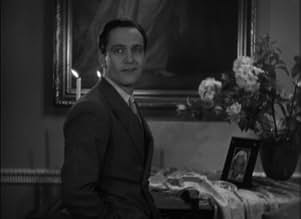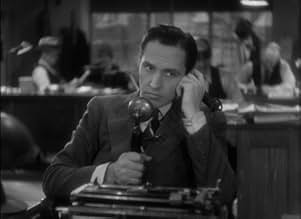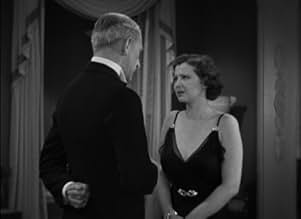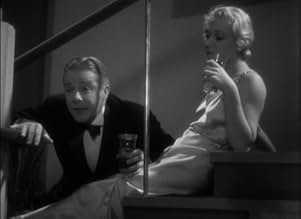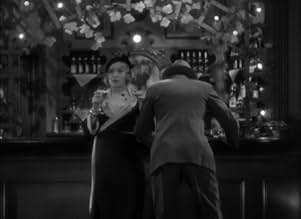AVALIAÇÃO DA IMDb
6,9/10
2,2 mil
SUA AVALIAÇÃO
Adicionar um enredo no seu idiomaA drunken newspaperman is rescued from his alcoholic haze by an heiress whose love sobers him up and encourages him to write a play, but he lapses back into dipsomania.A drunken newspaperman is rescued from his alcoholic haze by an heiress whose love sobers him up and encourages him to write a play, but he lapses back into dipsomania.A drunken newspaperman is rescued from his alcoholic haze by an heiress whose love sobers him up and encourages him to write a play, but he lapses back into dipsomania.
- Direção
- Roteiristas
- Artistas
- Prêmios
- 3 vitórias no total
Richard 'Skeets' Gallagher
- Buck
- (as Skeets Gallagher)
Ernie Adams
- Reporter
- (não creditado)
Mildred Boyd
- June
- (não creditado)
Edna Callahan
- Bridesmaid
- (não creditado)
Leonard Carey
- Prentice's Butler
- (não creditado)
Harry Cording
- Fred
- (não creditado)
Milla Davenport
- Prentice's Housekeeper
- (não creditado)
- Direção
- Roteiristas
- Elenco e equipe completos
- Produção, bilheteria e muito mais no IMDbPro
Avaliações em destaque
Frederick March and Sylvia Sidney star in "Merrily We Go to Hell," from 1932.
For those of us who only remember Sylvia Sidney as an older character actress -- and usually a pretty mouthy one at that -- seeing her as an ingénue is always a revelation.
Jerry Corbett (March) is a reporter and a drunk, still pining for the woman who broke his heart, Claire (Adrienne Allen). When he meets the lovely Joan Prentice (Sidney) from a wealthy family, the two fall for one another and marry.
Jerry wants to write plays, and he eventually is able to have one produced, early in the marriage. Unfortunately, one of the stars is Claire, and she's perfectly willing to take up where they left off. Jerry starts drinking again. Joan is heartbroken as well as hurt and starts drinking and partying herself. Finally, though, she returns to her father's home.
Nothing too surprising in the plot, but good performances all around. Sidney is pretty and vulnerable, taking a chance on a man her father disapproves of but whom she loves. March shows that Jerry is a weak man who in his heart doesn't believe he deserves the happiness he's had with Joan. Can these two find their way back to one another? Just guess.
Dorothy Arzner had a good sense of pacing, so the film doesn't drag or slow down. Worth seeing for the actors, not necessarily the story.
For those of us who only remember Sylvia Sidney as an older character actress -- and usually a pretty mouthy one at that -- seeing her as an ingénue is always a revelation.
Jerry Corbett (March) is a reporter and a drunk, still pining for the woman who broke his heart, Claire (Adrienne Allen). When he meets the lovely Joan Prentice (Sidney) from a wealthy family, the two fall for one another and marry.
Jerry wants to write plays, and he eventually is able to have one produced, early in the marriage. Unfortunately, one of the stars is Claire, and she's perfectly willing to take up where they left off. Jerry starts drinking again. Joan is heartbroken as well as hurt and starts drinking and partying herself. Finally, though, she returns to her father's home.
Nothing too surprising in the plot, but good performances all around. Sidney is pretty and vulnerable, taking a chance on a man her father disapproves of but whom she loves. March shows that Jerry is a weak man who in his heart doesn't believe he deserves the happiness he's had with Joan. Can these two find their way back to one another? Just guess.
Dorothy Arzner had a good sense of pacing, so the film doesn't drag or slow down. Worth seeing for the actors, not necessarily the story.
Cleo Lucas wrote 'I, Jerry, take thee Joan', her only novel, at the tender age of twenty-four and it has been adapted by Edwin Justus Mayer for Paramount whilst marking the last film directed for that studio by Dorothy Arzner before going freelance.
Early on in the film the newly engaged Jerry of Fredric March asks: "Have I a right to take a swell girl and make her a wife?" Thus setting the scene for another of Ms. Arzner's stealthy critiques of the married state.
As expected, her direction is impeccable, her editing seamless and the magnificent performances she has drawn from her two leading players makes this emotional rollercoaster riveting viewing.
The all-important chemistry between March and the enchanting Sylvia Sidney as Joan without which the film would not work, is palpable from the outset. Her character develops and grows in strength as the film progresses whilst in his fourth film for this director, his portrayal of a tragic drunk makes him perfect casting for the role of Norman Maine five years later. Classy English actress Adrianne Allen is Jerry's old flame whose reappearance spells disaster.
Ambivalence runs through Ms. Arzner's oeuvre, never more so than in the ending here which is both happy and deeply tragic.
Early on in the film the newly engaged Jerry of Fredric March asks: "Have I a right to take a swell girl and make her a wife?" Thus setting the scene for another of Ms. Arzner's stealthy critiques of the married state.
As expected, her direction is impeccable, her editing seamless and the magnificent performances she has drawn from her two leading players makes this emotional rollercoaster riveting viewing.
The all-important chemistry between March and the enchanting Sylvia Sidney as Joan without which the film would not work, is palpable from the outset. Her character develops and grows in strength as the film progresses whilst in his fourth film for this director, his portrayal of a tragic drunk makes him perfect casting for the role of Norman Maine five years later. Classy English actress Adrianne Allen is Jerry's old flame whose reappearance spells disaster.
Ambivalence runs through Ms. Arzner's oeuvre, never more so than in the ending here which is both happy and deeply tragic.
Fredric March and Sylvia Sidney star in Merrily We Go To Hell, the story of a nice rich girl who falls in love with an alcoholic newspaperman who has ambitions for greater things to turn his writing talents to. The title comes from a favorite drinking toast of March's.
Occasionally Fredric March turned in some fine performances of some dissolute characters. Later on he would get Oscar nominations for A Star Is Born and Death Of A Salesman and his part in this film can be seen as a harbinger of things to come.
For once Sylvia Sidney was not a child of the slums, she's a rich girl here who falls for March who keeps falling off the wagon. When he gets his play finally produced slinky actress Adrienne Allen comes between Sylvia and Fred. Incidentally playing a small role as Allen's lead in the play is Cary Grant.
The story verges into the melodramatic, but Dorothy Arzner gets some good performances from her stars and their support. Pay note to March's reporter sidekick Skeets Gallagher who has some interesting observations.
Fans of the stars should be pleased.
Occasionally Fredric March turned in some fine performances of some dissolute characters. Later on he would get Oscar nominations for A Star Is Born and Death Of A Salesman and his part in this film can be seen as a harbinger of things to come.
For once Sylvia Sidney was not a child of the slums, she's a rich girl here who falls for March who keeps falling off the wagon. When he gets his play finally produced slinky actress Adrienne Allen comes between Sylvia and Fred. Incidentally playing a small role as Allen's lead in the play is Cary Grant.
The story verges into the melodramatic, but Dorothy Arzner gets some good performances from her stars and their support. Pay note to March's reporter sidekick Skeets Gallagher who has some interesting observations.
Fans of the stars should be pleased.
A wonderful and unsettling pre-Code film about an alcoholic playboy (Fredric March) who marries a sweet young thing (Sylvia Sidney) and proceeds to drag her down his path of dissolution. The depiction of their marriage is quite shocking, even by today's standards -- not only do they have an "open" marriage, they openly practice that freedom in front of their friends, suggesting a swinging lifestyle that wouldn't become approachable as subject matter in films for another 30+ years. March and Sidney give fantastic performances, and Dorothy Arzner, one of the rare women directors of the time, takes a matter of fact approach that leaves behind the melodrama and sentimentality that might have blunted this same story's impact in the hands of someone else.
One of the most refreshing aspects of "Merrily We Go to Hell," and one of the most shocking, is that Sidney's character does not suffer nobly while we wait for March to see the error of his ways and come back to her a chastened man. Instead, Sidney starts to behave just like him, coming within a stone's throw of alcoholism herself, and doing her own share of philandering. In that way, the film is even a little progressive in its equal treatment of the genders, even if that equality is the equality of debauchery.
Grade: A
One of the most refreshing aspects of "Merrily We Go to Hell," and one of the most shocking, is that Sidney's character does not suffer nobly while we wait for March to see the error of his ways and come back to her a chastened man. Instead, Sidney starts to behave just like him, coming within a stone's throw of alcoholism herself, and doing her own share of philandering. In that way, the film is even a little progressive in its equal treatment of the genders, even if that equality is the equality of debauchery.
Grade: A
Everybody here is terrific, and Paramount brought out its A-list stars for the leads, Sylvia Sidney as heiress Joan Prentice and Fredric March as aspiring playwright Jerry Corbett. They are a young couple who marry in spite of the fact that Jerry is an alcoholic who is still stuck on a past heartbreak, stage actress Claire Hempstead.
The plot treads a conventional path full of precode tropes - infidelity, drunkenness, open marriage, the inconvenient pregnancy, and the wealthy family of one spouse distrusting the not so wealthy other spouse and his motives. But yet it is interesting because of several - "Wow did they do that back then?" moments.
For example - Jerry works at a newspaper. When somebody makes an insulting remark about his upcoming wedding, Jerry punches him in the throat. And yet nobody gets fired or arrested. Prohibition is still in force, and everybody drinks everywhere. Nobody even bothers with the discretion of a flask. There is booze at private parties, booze in public places, booze everywhere. When a turkey gets accidentally dropped on the floor, the alternative is... canned chicken??? Ugh. I would think the couple didn't want to have me over for dinner in the first place. Then there is Jerry's hit play up in lights - "When Women Say No - a satirical comedy". Yikes!
Need I mention that the art design and Sylvia Sidney's fashions are gorgeous. With Skeets Gallagher as Jerry's best friend, the great Esther Howard who seems to be in some kind of relationship with Skeets' character and had a marriage end because of her former husband's drinking - she's always memorable, and Cary Grant as one of Joan's extramarital escorts with what seems to be his original nose.
The plot treads a conventional path full of precode tropes - infidelity, drunkenness, open marriage, the inconvenient pregnancy, and the wealthy family of one spouse distrusting the not so wealthy other spouse and his motives. But yet it is interesting because of several - "Wow did they do that back then?" moments.
For example - Jerry works at a newspaper. When somebody makes an insulting remark about his upcoming wedding, Jerry punches him in the throat. And yet nobody gets fired or arrested. Prohibition is still in force, and everybody drinks everywhere. Nobody even bothers with the discretion of a flask. There is booze at private parties, booze in public places, booze everywhere. When a turkey gets accidentally dropped on the floor, the alternative is... canned chicken??? Ugh. I would think the couple didn't want to have me over for dinner in the first place. Then there is Jerry's hit play up in lights - "When Women Say No - a satirical comedy". Yikes!
Need I mention that the art design and Sylvia Sidney's fashions are gorgeous. With Skeets Gallagher as Jerry's best friend, the great Esther Howard who seems to be in some kind of relationship with Skeets' character and had a marriage end because of her former husband's drinking - she's always memorable, and Cary Grant as one of Joan's extramarital escorts with what seems to be his original nose.
Você sabia?
- CuriosidadesThe word "Hell" could not be used in the UK as part of a title, so the UK version was simply retitled "Merrily We Go to ____".
- Erros de gravaçãoIn the latter part of the picture Jerry Corbett (Fredric March) receives a letter in a postmarked envelope from his wife Joan (Sylvia Sidney). It's addressed to Jerry with his name and street address, but no city.
- Citações
Joan Prentice: Gentlemen, I give you the holy state of matrimony, modern style: single lives, twin beds and triple bromides in the morning.
- ConexõesFeatured in Women Make Film: A New Road Movie Through Cinema (2018)
Principais escolhas
Faça login para avaliar e ver a lista de recomendações personalizadas
- How long is Merrily We Go to Hell?Fornecido pela Alexa
Detalhes
- Data de lançamento
- País de origem
- Idioma
- Também conhecido como
- Contentos vamos al infierno
- Locações de filme
- Empresa de produção
- Consulte mais créditos da empresa na IMDbPro
- Tempo de duração1 hora 23 minutos
- Cor
- Proporção
- 1.37 : 1
Contribua para esta página
Sugerir uma alteração ou adicionar conteúdo ausente

Principal brecha
By what name was Quando a Mulher Se Opõe (1932) officially released in India in English?
Responda
